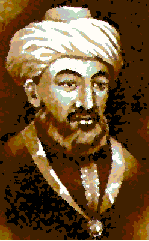Maimonides, Moses
Maimonides, Moses
Copyright © 2025 bible.booksAI.org - All rights reserved)

Maimonides, Moses
Maimonides, from Cordoba in southern Spain, the greatest Jewish medieval philosopher, was also the most systematic codifier of Jewish religious law. His work gives a fascinating glimpse into the detailed word-study of the Hebrew Torah which marks the Jews as 'Am haSefer ("the People of the Book"). As a philosopher who was also a religious Jew, ben Maimon probed deeply into the possible meanings of revealed terms, especially in the Pentateuch and the Prophets, that might further unveil the essence of God. He investigated the declaratory force of the names of God, and of biblical terms used about God's actions: "God saw" "He spoke" "He came down" "He showed mercy" etc.
His major work, Dalalat al-ha'irin (Guide of the Perplexed), attempts to make a bridge between religious law and human reason. He combines a fine sense of Torah-based piety with a deep regard for the Aristotelian philosophy, without suppressing the issues between them or trying to impose any final, solution of the tensions between religious and rational thought. In chapters 51-60, he offers some keen reflections on the divine attributes a topic that greatly interested the Christian scholastic theologians of his own and subsequent generations.
The revival of Aristotelianism by Averroes and Avicenna, and its use by Maimonides in treating of fundamental religious issues, eventually caught the imagination of Christian scholars in the university of Paris, including Thomas Aquinas (whose Summa Theologica is imbued with Aristotle's analytic approach,) with the result that, from the 13th century onward, that Greek philosopher's thought came to seem almost an essential background for the exposition of Christian theology.
Copyright © 2025 bible.booksAI.org - All rights reserved)